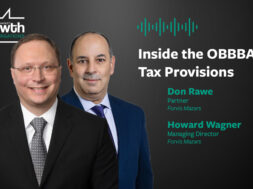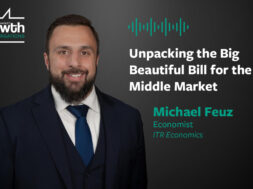Middle-Market Public Policy Roundup
Congress releases a report explore how it could tax carried interest, and the House holds a hearing on capital markets, which focused on disclosure requirements to investors and stock buybacks.

In this week’s roundup, we look at a report exploring ways that Congress could tax carried interest in the future. We also provide a summary of a congressional hearing on capital markets that took place this week, which focused on legislation and regulatory actions that would impact disclosure requirements to investors and stock buybacks.
Congress Releases Report on Carried Interest Taxation
Congress has taken notice of the compensation for private equity fund managers and produced a report on how lawmakers could shape it in the future.
The report, published by the Congressional Research Service on July 9, didn’t come to any firm conclusions on how Congress would tax carried interest, but it gave lawmakers some options—including retaining taxes at their current levels and taxing carried interest as a loan.
The first policy proposal is to keep taxes on carried interest at their current levels. The report says that lawmakers might keep tax levels steady because raising them could discourage investment and decrease returns for pension funds and other institutional investors.
The report notes that it’s unclear to what extent the current treatment of carried interest promotes innovation and market efficiency, and suggests a second policy proposal that would treat carried interest as ordinary income.
Some legislation in the works would do this. The Carried Interest Fairness Act (S. 781 and H.R. 1735) would raise $14 billion in tax revenues by 2028, according to the Congressional Budget Office.
“Proponents argue that the general partner is being compensated for providing the labor to generate a positive return on investment for the fund—similar to how other workers provide their services to their employers,” the report said.
The report warns Congress that taxing carried interest as ordinary income could be excessive and push managers into riskier investments.
The third option for lawmakers would be to tax portions of carried interest as ordinary income and others as capital gains.
The final proposal in the report suggests that carried interest be treated as a loan from limited partners to the general partner. The Ending the Carried Interest Loophole Act (S. 1639) would treat carried interest in this way.
Lawmakers, Witnesses Spar over Disclosure Requirements Stock Buybacks and at Capital Markets Hearing
As more companies derive value from their workers and intellectual property, investors are asking that companies disclose more information that measures the impact of human capital.
That was the case made by Anne Simpson, director of board governance and strategy for the California Public Employees’ Retirement System at a hearing before the House Subcommittee on Investor Protection on Tuesday.
Simpson says there’s not enough information to measure human capital under the current regulatory regime. Over 80% of the balance sheets at S&P 500 companies are categorized under “intangibles,” which includes human capital values, Simpson says. Thirty years ago, 80% of balance sheets were made up of fixed assets, like factories and other physical hardware.
Simpson also serves on the Securities and Exchange Commissions’ Investor Advisory Committee, which made recommendations on human capital management disclosure in March.
“Financials need to be standardized, they need to be audited, there needs to be regulatory oversight of those standards. And for human capital, which has been thought of for too long as a cost, is actually an asset,” she said.
The U.S. Chamber’s Bradley responded, saying it can cost a small company an average of $2.5 million to comply with existing disclosure requirements, and additional requirements could levy heavier burdens.
“That’s a fixed cost imposed on them by government. They have no choice but to comply with the mandates passed by Congress and to absorb that cost or pass it along in some form or fashion,” Bradley said.
None of the legislation being considered at the hearing would expand disclosure requirements for companies. Currently, the SEC is considering a rule change to S-K regulations that would lessen the requirements for disclosure reports to investors.
The other bills debated at this hearing would have to move on to the House Financial Services Committee and then later on to the Senate.
Lawmakers and Witnesses Debate Buybacks
Leading up to the COVID-19 pandemic, publicly traded companies spent trillions of dollars on stock buybacks, a financial strategy where companies distribute capital to shareholders by repurchasing their own stock. Some of those companies have continued their buyback programs even as they receive federal aid and lay off workers, and lawmakers say it’s time to stop.
“If this capital was in the hands of corporations, they would be better positioned to deal with the current downturn—now many of these companies are announcing layoffs of employees,” said Rep. Brad Sherman, D-Calif., and chair of the House Subcommittee on Investor Protection.
The subcommittee considered multiple pieces of legislation, including the unnamed bill, H.R. 6339, which would ban stock buybacks until the impact of COVID-19 on the American financial system has ended. Other bills would impose limitations on companies repurchasing stock while receiving federal loans.
“The idea we would give money to a company as a loan and instead of supporting the business, that money goes out to shareholders in stock buybacks is simply outrageous,” Sherman added.
Many of the bills under consideration have not yet been finalized. While the proposed legislation deals primarily with payouts to shareholders of public companies, past congressional hearings—such as one held in October 2019—increased focus on dividend recapitalizations, a similar practice done by private companies.
Rep. Bill Huizenga, R-Mich., agreed with Sherman that the federal government needs to do more in support of the economy but erred on the side of deregulation.
“Congress needs to create an environment that encourages entrepreneurship and innovation while removing regulatory hurdles slowing growth for our public companies,” he said. “We must expand work to improve and expand access to capital markets, help grow our small businesses and increase more investment opportunities, as well as choices for Main Street investors in hopes of growing their savings and creating a brighter and more prosperous retirement.”
Witnesses, including William Spriggs, chief economist for the AFL-CIO and professor of economics at Howard University, recommended that Congress scrutinize companies that take federal aid and then use it for financial engineering rather than retaining workers or making investments in the long-term growth of the company.
“It’s prudent to be worried about the money we are sending to these companies,” he said. “We cannot have the money from Congress wasted on financial activities. It needs to go to the real economic activities.”
Spriggs also said Congress should change the structure of tax breaks when companies engage in stock buybacks after receiving federal aid.
Another witness, Neil Bradley, executive vice president and chief policy officer at the U.S. Chamber of Commerce, cautioned against making “permanent” policy decisions, favoring a phase four stimulus bill that’s “timely, temporary and targeted.”
Bradley said the bills being considered, including H.R. 6339, would set back the economic recovery and impede the restoration of jobs. “Changing the rules mid-game is the surest way to make sure employers don’t apply for aid, which just means more unemployed,” he said.

Benjamin Glick is Middle Market Growth’s associate editor.


